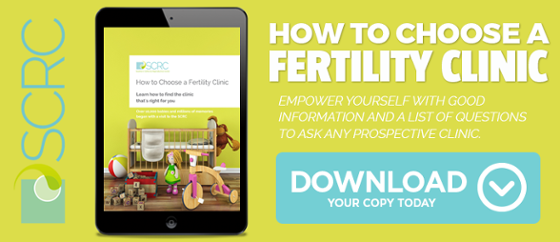
Donor reproduction or third party reproduction is a process where someone other than the intended parent or parents provides DNA (in the form of an egg or sperm) or gestation (through surrogacy) to help bring a baby into the world. The use of donor sperm in intrauterine insemination (IUI) and in vitro fertilization (IVF) is the most common type of third party reproduction, and there are many reasons why it’s such a good option for so many patients.
While sperm donation has often been the butt of jokes in the media and the process is often misunderstood, third party reproduction of this type is a very routine part of modern fertility treatment. Sperm donors make it possible for all kinds of families to welcome a new child into their lives, and we think the subject deserves a spotlight. Today, we’ll take a look at the types of patients whose lives can be transformed by fertility treatments using donor sperm.
How does sperm donation work?
In a medical context, sperm donation is a highly controlled, discreet process. Registered sperm donations are managed by sperm banks or agencies which keep meticulous records.
- Donors are carefully screened: at some major sperm banks only about one in every hundred applicants is accepted.
- Potential donors undergo extensive psychological, genetic and STI testing before they donate, and in order to ensure that there is no risk of transmitting an infectious disease such as HIV, the Food and Drug Association (FDA) requires that all donated sperm be frozen for a period of 6 months.
- At the 6-month mark, the donor is retested to confirm that they are disease free before the sperm becomes available for use.
In the United States, if you use a registered sperm donor the donor legally has no ties to any resulting child. Most sperm donation is still anonymous, but donors may agree to be to be contactable after the child reaches the age of 18: as the intended parents you can choose which option you feel the most comfortable with.
Intended parents can search through a database of anonymized donor profiles to find a good match. Profiles include information such as physical and personal characteristics, medical and genetic history, academic achievements, and often childhood photographs. Many families look for a donor with similar physical features to themselves and/or one who shares the same ethnic or religious background. In some cases, the intended parent may look for a donor with attributes they think would complement their own.
Once a donor is selected, the agency will generally send vials (sometimes referred to as “straws”) of frozen sperm to the fertility clinic. The sperm samples are then carefully thawed in the lab to be used in IUI or IVF.
Why might I need a sperm donor?
Nothing in the world for fertility medicine is one-size-fits-all. While there are common themes and helpful statistics shared by many patients, in the end every case is unique. The decision to move forward with fertility treatment using a sperm donor is a very personal one which patients make for a wide range of reasons. However, it can be helpful to know that you’re not alone, and that others before you have walked a similar path. Some of the most common reasons to use a sperm donor include:
- Medical conditions and male-factor infertility: Male-factor infertility contributes to up to half of all cases of infertility. While there are many effective treatments which can help men with low or even very low sperm counts, including IVF with intracytoplasmic sperm injection (ICSI) and various sperm retrieval techniques, in some cases a man may produce no viable sperm at all. Some men have recently undergone treatment for cancer which may have damaged their sperm and their fertility. Some may have been born without male reproductive organs. Others live with autoimmune conditions which can affect the function of their reproductive system. Using a sperm donor can often provide a very successful result for all of these patients.
- Genetic diseases and conditions: Men and couples who know that they are carriers of or at risk for potentially dangerous genetic diseases may choose to use a sperm donor to avoid passing on the condition to any resulting children. In cases like these, sperm donation can provide priceless peace of mind and hope in potentially heartbreaking circumstances.
- Lesbian couples: Female same-sex partners often decide to use a sperm donor to become parents. There are several fertility options available for LGBT couples. IUI is the most common but reciprocal IVF (where one partner provides the egg and the other partner carries the pregnancy) is a beautiful alternative which is becoming more popular.
- Single women: Single women who either by choice or by circumstance do not have a partner but who want to become mothers can use sperm donation to have children on on their own terms. An anonymous sperm donor provides a clear path to parenthood without legal, personal, or custody complications. For young women with no fertility challenges, IUI can be quite effective. IVF is also common, and it provides the added benefit that any extra embryos can be frozen for later use, with very high success rates.
We know that the choice to use a sperm donor isn’t always easy: there are often emotional and psychological barriers to overcome, which can be complicated by cultural or religious factors. It is a profoundly personal decision, but also a deeply empowering one. Sperm donation, like egg donation and surrogacy, can provide the life-changing opportunity to become parents to individuals, couples, and families who might not ever have that chance otherwise.
If you think that you or someone you love might benefit from learning more about using donor sperm for fertility treatments, don’t hesitate to reach out for more information. Here at SCRC, we have had the honor to see how much joy this fertility treatment option has added to the world, and we are always delighted to talk to prospective patients about how it might work for them.
Share this on social media:





